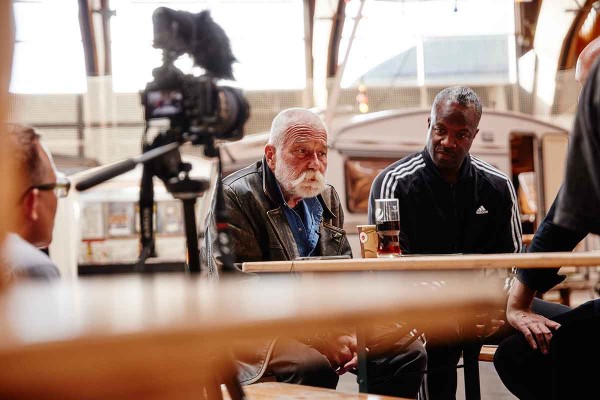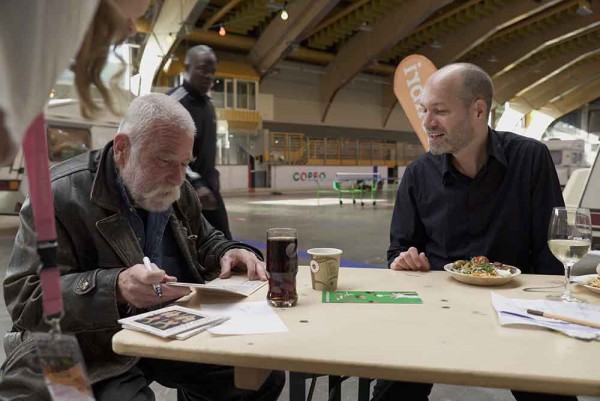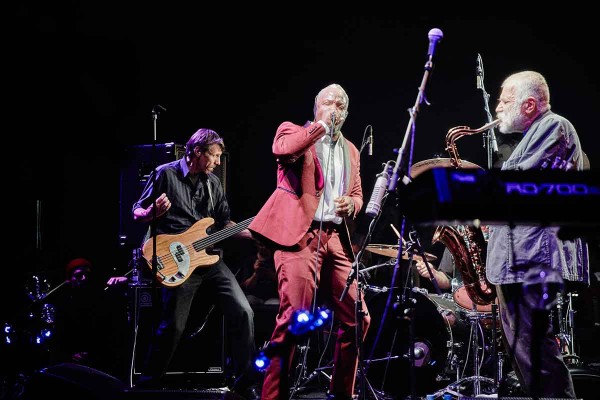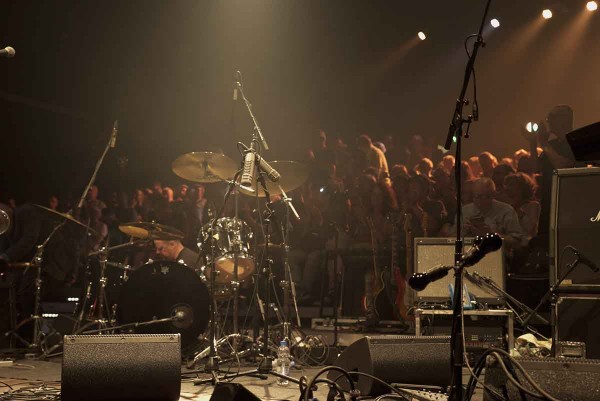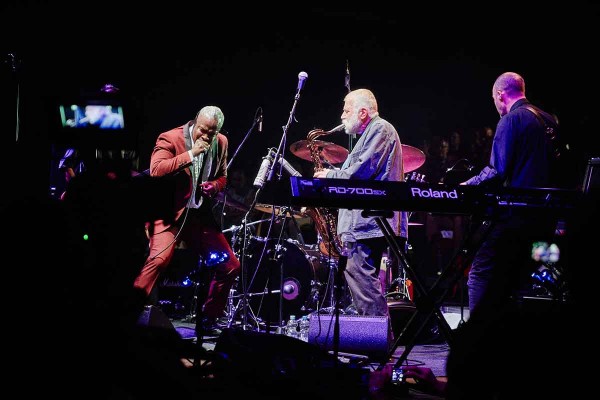It’s not the twelve bar, it’s the person behind!
On Sunday the 20th of May, free-jazz legend Peter Brötzmann got together with Dan Adams, Greg Davis, Eugene Robinson and Niko Wenner of Oxbow to deliver an utterly transcendental performance at the Moers-Festival, (at the personal request of Tim Isfort, the conductor of the festival.)
Interview by Thomas Venker / Photos by Rainer Holz.
Peter Brötzmann: 1, 2, 3, 4, 5.
Peter, Niko, Eugene, how did this collaboration come together?
Peter Brötzmann: That’s very simple. This was Tim Isfort’s idea. He came to visit me a few times and we talked about what we could do and one of his suggestions was to work with Oxbow. I only knew a little bit about the band, so I got up to speed… And I am glad we did it.
You say that now!
(all laughing)
Peter Brötzmann: Right, I realized my little mistake. We will see!
Eugene Robinson: We have friends in common, too, right? Lydia Lunch, Michael Werthmüller. So we have been around the same places.
Peter Brötzmann: Yes.
Niko Wenner: I’ve been waiting for a long time to play with this guy. I am excited to play in the most screwed up way.
Are you able to say what you are looking for in each other’s sound?
Niko Wenner: Last night at rehearsal something happened that I was thinking might happen: We as four guys, we play together for more than 30 years and we become very comfortable what we do – and Peter brought some discomfort as far as roles. I haven´ t been playing out there… That’s great. That pushes me.
Peter Brötzmann: We are using Oxbow material and I am just the little outsider and try to find my space. I think we have at least one thing in common: a certain kind of energy, which we could share and where we will meet. It should work.
Is the material you rehearsed just one of several possible paths for the concert?
Peter Brötzmann: As far as I understood we will use some of the stuff we tried yesterday and what happens then – we will see.
Niko Wenner: I am expecting more chaos. Which is good.
Peter Brötzmann: I think all of us are open for whatever will happen. We will make the best out of it.
How long did you rehearse yesterday?
Niko Wenner: We spend a lot of time in the room, but actually played maybe an hour and a half.
Eugene Robinson: And I was late.
Peter Brötzmann: As usual?
Eugene Robinson: No, not as usual. But I slept for half an hour.
Niko Wenner: I would love to call tunes tonight which we didn’t practice. Try things we didn’t try.
Peter Brötzmann: Yeah, I am also looking forward to the improvised section.
Peter, did you know the material before?
Peter Brötzmann: No. My sources were just a little bit of YouTube, which is always a little bit dangerous. Heather Leigh who I am working with, told me quite a bit about the band. But that’s all. I mean, if it wouldn’t have worked yesterday at the rehearsal, I would have said: Fuck You!
(all laugh)
Peter Brötzmann: Or they would have said: that sounds horrible – out of here! No, no. We have certain things in common, so it should work.
- Eugene Robinson
- (Photos by
- Rainer Holz)
Talking about collaborations, do you pick certain elements you are interested in out of the sound texture or do you go riff on the other person and their sound?
Peter Brötzmann: For me this kind of situation is not a new one. I am always looking for challenges outside the jazz context. Take as an example the year of Last Exit, which was a good challenge for me. Or at the moment I am working for a couple of years with a Portuguese Rock´n´Roll band named Black Bombaim. The collaboration with Heather Lee is also a completely new way of thinking and playing for me. For all of us challenge is the most important part, otherwise you feel too comfortable after 30 years.
Niko Wenner: We could start intellectual and think about what could happen and what we want to happen. But it will be fully successful only if things happen we don’t expect. It has to be a surprise.
Eugene Robinson: In other words: we want the unexpected, the surprise. Otherwise it doesn’t work out.
How much is the presence of Peter Brötzmann changing the Oxbow material. Is it thinkable that as a reaction on the thing he plays for example one of you would stop his part in total for a while or dramatically change it?
Niko Wenner: That’s right. We hope so. We are open to that. It is good for us. We considered not playing any songs, but playing songs is part of our character, that’s what we do.
Peter Brötzmann: Coming from my experience over the last few years, especially with my studio recording experience with certain people, I wouldn’t say its getting back to songs, but after all these years of endless wild play I really like the change of coming back to that.
Looking at collaborations like yours from the outside, I wonder how important your origins are. For example, does it matter that you come from Wuppertal, Peter, and you guys from San Francisco?
Niko Wenner: I think it is up to the individual, it doesn’t matter where they are coming from.
Peter Brötzmann: That’s right.
Peter, next week you’re flying to the US to play some concerts with Keiji Haino. I wonder how the working process with someone like him is in compared to the one with Oxbow.
Peter Brötzmann: That’s been a little postponed. We will do that in August now. I’ve been working with him for about 30 years, I know the guy very well. We are very used to each other. So of course the working process is different. Besides that: he is alone and not a band. If you know him a little bit, he is really unpredictable in what he is trying to do. But the good thing with Keiji: whatever he tries, he makes something good out of it.
Are you saying they are more predictable in what they are doing?
Peter Brötzmann: Not yet. But for a single person it is much easier to be just himself. But that said, you never know how it will be on a given day. It could be also full of surprises. So lets make it like that. We will have some fun.
Niko Wenner: It is interesting to hear you moved more towards songs lately, maybe generally more towards structure. We also have moved from more chaotic, less structured recordings and performances to pushing against structure. I point that out, as we both seem to arrive at the same place.
Peter Brötzmann: I’ve been doing so-called ‘improvising’ all my life. Or most of it. The last big experience was the work with the Chicago Tentet where we started with pieces, tunes, compositions but then I decided: Fuck that – we are old enough to improvise. But of course you reach a certain point where you have played it all. After that it’s not a decision, it is a process.
Going a little backwards, playing certain structures, certain patterns, certain melodies gives you another feeling. Especially since I’ve been working with Heather Leigh with that funny instrument, the pedal steel guitar. When she asked me, I even didn’t know what that was and had to look it up! It is a completely different world, not the bass and drum business, it is something else. The people quite often come after the performances and ask wrote the compositions – we don’t have any! But it is a very structured and very clear music in a way. Maybe I am just tired of this free-jazz bullshit. (laughs)
Niko Wenner: Some restrictions are good.
Eugene Robinson: In any situation where people have been doing something for a significantly long period, I think the issue becomes: how do we keep ourselves amused? That’s the great challenge. If we are not amused, we might as well work in factories.
Niko Wenner: Hopefully the audience feels the same and is amused as well.
Eugene Robinson: The music we’re pursuing is one that instinctively feels better. We got pleasurable experiences versus unpleasurable ones. It gives me great pleasure to do things the way we do, as opposed to being purely intellectual or academic.
Peter Brötzmann: I am in a way a very simple minded guy. Since I was a kid, I was listening to the blues. I mean, I am a white guy, I am a European, but I was always trying to understand the blues. And guys like him (looks towards Eugene), they helped me to do that. The blues to me is the essence of music, whatever form, whatever the kind. It is not the twelve bars, it is the person behind the music. In our kind of music – it is always about the person behind. Jazz history is a history of people, not styles. If you look what Armstrong did, if you look what Ellington did, some crazy shit, really great stuff. I have the feeling a lot of the young guys don’t know anymore where it is coming from. It is sometimes really sad what you hear. What those guys learn at the conservatoire, I have no idea.
How political is such a collaboration for you guys?
Niko Wenner: Everything is political, right?
Peter Brötzmann: As soon as you go on stage, it is political. In a very wide sense. It’s a statement. And it’s a political statement too.
Have there been times in your career where you lost your belief in the working process with other musicians?
Peter Brötzmann: It goes always up and down. And I can tell you, I’ve had times where I was sitting at home and saw a man who tomorrow sells his horn. That is a natural thing. That happens. The only thing that helps is work.
Niko Wenner: We are a group of people. We like that, we push each other. We keep it interesting by doing interesting things. There are two things: recordings and performances. The performances are enlivening and we get lot of energy of them. In the recordings we have done over the years there have been some great collaborations. Recordings are really important to us, to what we do – but it’s not what we play live.
Peter, you are also a visual artist. Does art help you through the more difficult moments of music?
Peter Brötzmann: It’s essential for me to have time for that. Because it is such a different thing to do. You know, during the last few years, I haven’t had time to work constantly on art. I just did little things on the side. But I am looking forward to this summer, because this summer is a little bit more quiet, not too much playing. I like to be alone, and in my studio I am alone. The difference is: when I am doing art for too long, I then miss being on the road. I miss having the guys around, the travel and all those things .I think for me it’s fitting well together. I need both of them.
I guess it is the same with you and Oxbow. There are long periods of a break where you all do other jobs and music projects , but then you always come back.
Niko Wenner: I am not doing visual art myself, but I find it endlessly inspiring when I go and see a collection at a museum. There is a direct correlation between the music of Oxbow and some pieces of art. I could tell you different songs that are based on this or that piece. I forget about this sometimes and I don’t go and see art and then…
I already stole a lot of your time here. Peter to come to an end, there is this phrase brötzen. What does this mean to you?
Peter Brötzmann: I am a bit tired of all this bullshit. If you once have an image, and it comes out of the formative years… there is even a music venue in Gothenburg named ‘Brötz’ and the bands playing there, it goes from one Brötz to ten Brötz. As loud as it could be, complete nonsense. But I have to live with that.
You know, this year, the “Machine Gun” recording of the Peter Brötzmann Octet is fifty years old, there are a lot of guys, writers, journalists that still judge me just about this record. they haven’t heard what I have done since then! You have this image and it sticks – even if I can play ballads and ballads and ballads… (laughs)
That’s the tragic part of an artistic career, you work so hard against all the limitations out there, and then those people think they’ve got you nailed from the first bars.
Niko Wenner: Yes, Thomas, … why is that? (laughs)
Don’t ask me! I am a journalist, because I’m always keen to find the new stuff!
Niko Wenner: Because it is easier for them.
Thanks a lot for your time. I’m very much looking forward to the concert.








